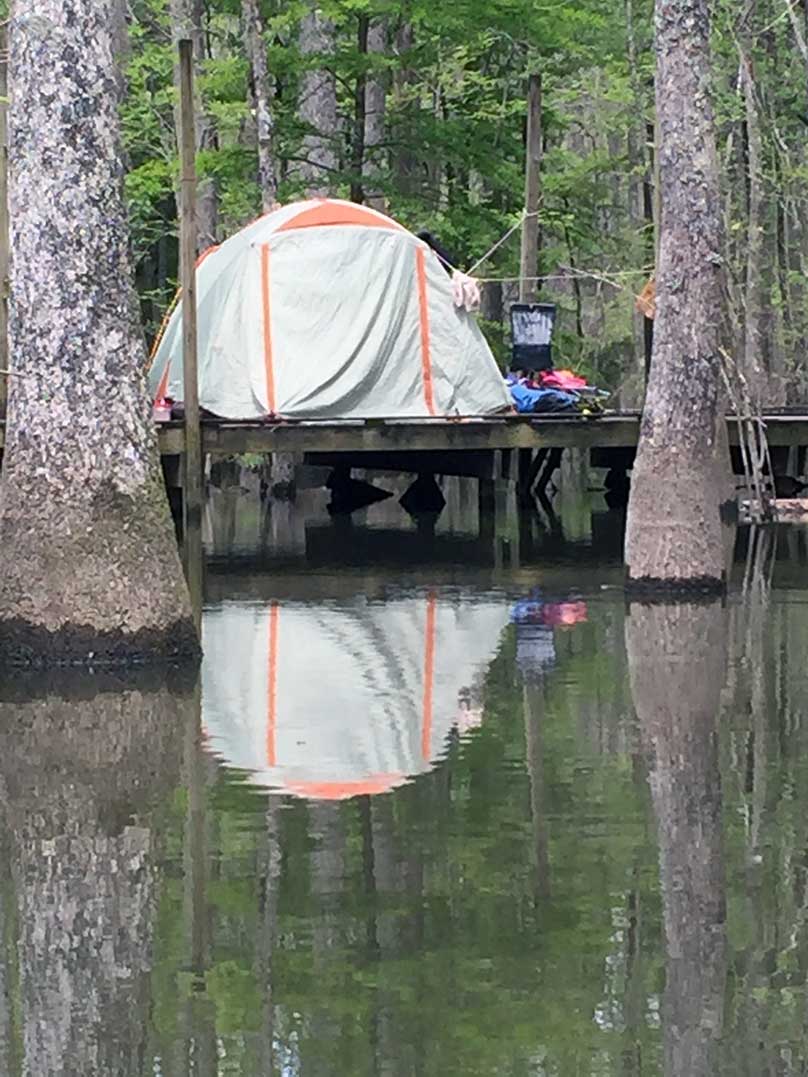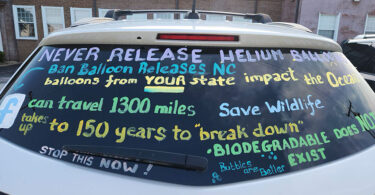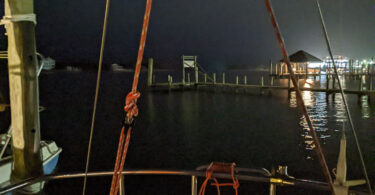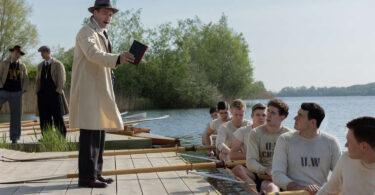Roanoke River camping ten miles back in the swamps, the ultimate in social distancing. PHOTO BY GINGER TRAVIS
First of Two Parts
Ginger Travis
NOTE: As I write this in March, a lot has changed since the end of 2020: people getting vaccinated, the rate of new cases falling, less isolation. As long as COVID remains a threat, camping will be tonic for body and soul.
Camping was our salvation in 2020. My partner and I made our first trip early in the COVID pandemic and kept right on going past the first frost—eight trips, May through November. Nothing fancy, just tent camping out of a car and two canoe trips.
Living outdoors was our escape from isolation and boredom. We were always happy—will always be happy—when we’re camping or planning to camp.
Lessons learned about pandemic camping: The single biggest lesson for us is that there’s hugely increased demand for campsites now as more people are flocking outdoors. Making reservations well in advance is crucial. All state parks in NC now require campsites to be reserved either online or by phone. There’s no more driving in, grabbing an open site, and registering.
In 2020 our strategy for getting a campsite was to start our reservations on a Sunday or Monday when weekend campers would be leaving.
Also crucial: learning to avoid places and situations where the virus is likely to be transmitted. On the long drive to a park, we learned to make bathroom stops as short as possible. Run in, run out, wear a mask, sanitize your hands again in the car. Once in camp, no shopping, no going out to eat; we brought everything we needed. And we avoided the campground bathhouses because many were cramped and poorly ventilated. Instead we used our portable toilet (bought long ago for camping in the Roanoke River swamps) inside a popup utility tent. For showers we’d go to the bathhouse at a time of day when no one else was there—usually early morning.
The last lesson was and is to keep having fun! Go someplace new. Learn something new about nature. Go someplace where there’s nobody else. Cook on a campfire. Teach a kid to love camping. But just go!
The rest of this story describes the first two camping excursions we made in 2020, one by canoe, a real adventure, and the other car camping. In Part 2, we’ll describe the others: Roan Mountain State Park (TN), Lake Powhatan Recreation Area (NC) Grayson Highlands State Park (VA), Great Dismal Swamp National Wildlife Refuge (VA, by canoe), Stone Mountain State Park (NC) and Pettigrew State Park (NC). All great places.
Where We Went In 2020
Roanoke River swamps near Jamesville, NC, May 10-15 (Sun-Fri). Five days, four nights, 38 miles by canoe on the river and in its swamp forests. We camped on two of the spacious wooden platforms maintained by the nonprofit Roanoke River Partners: Cypress Cathedral on Broad Creek and Beaver Tail on Upper Deadwater Creek off Devils Gut. Early May is grand there—blue skies and blue flag (wild iris) in bloom. Birds galore. We had Yellow-billed Cuckoos nesting 25 feet above our platform and Prothonotary Warblers buzzing us as they foraged low around our camp. And the amazing thing was that we were utterly alone there. It was the ultimate in social distancing! Spring and fall are the best times to go. Although the river trip can be quite benign, it’s not for complete beginners. Our trip at high flow was challenging. A local outfitter, Roanoke Outdoor Adventures, can provide rental canoes and information. A special requirement of platform camping is that campers must take some kind of toilet, even if just a five-gallon bucket, and carry out all waste. Cooking is with camp stoves; no campfires are allowed. Reservations are required. See roanokeriverpartners.org website.
Merchants Millpond State Park near Gatesville, NC, June 1-4 (Mon-Thurs). The family campground (car camping) is a wonderful base camp for paddling day trips on surrounding blackwater rivers and creeks such as the Chowan, Meherrin, Potecasi and Catherine/Warwick. Most are quite protected and very scenic. The 760-acre millpond itself is a gem, beautiful and strange, with fantastically twisted tupelo trees and bald cypress. There are canoe-in and hike-in campsites. There also are alligators, though we didn’t see any. Bugs were not a bother on our trip, and the 20 drive-up sites were clean, shaded, spacious and pleasant. Important to know. This state park, like all others in NC at this time, requires reservations that can be made either online or by phone, with links and numbers at ncparks.gov. Also, where campgrounds are open, other park facilities may be closed. It’s important to check. Information is updated promptly at ncparks.gov.








